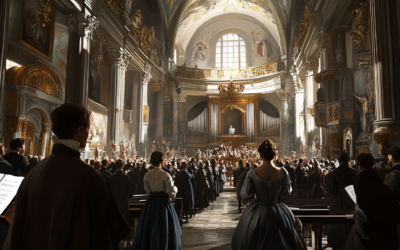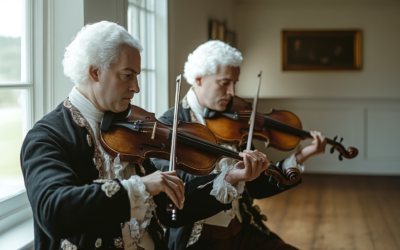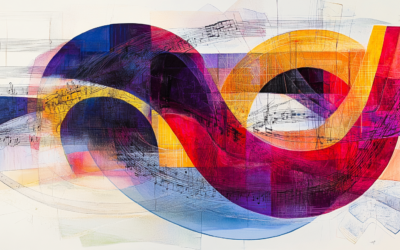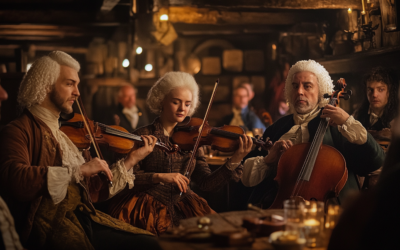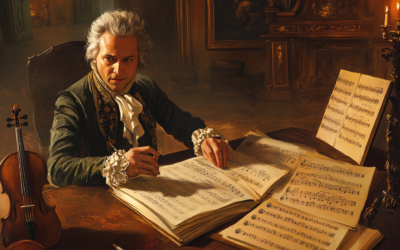Leopold Mozart
The Myth of Mozart: A Closer Look at the Man Behind the Legend
A critical examination of Wolfgang Amadeus Mozart’s life reveals a man shaped more by his father’s ambitions than by innate genius. Stripped of the myths, Mozart’s early years reflect a childhood dominated by relentless touring, inconsistent education, and a legacy built on exaggerated achievements. Discover the real story behind the legend.
“It wasn’t like that, because Leopold chose to rush his children’s development, making them perform immediately as circus attractions, dragged from place to place, even at the risk of their lives, just to astonish an audience that was generally incompetent and merely seeking entertainment”
Mozart in Italy
Wolfgang Amadeus Mozart is often celebrated as a musical prodigy and a genius whose talents were unparalleled. However, the reality of his life, as revealed through a more critical examination, suggests a different story. Born into a family where his father, Leopold, had grand ambitions, Mozart’s early years were shaped more by his father’s aspirations than by his own natural genius.
From the moment Wolfgang was born, Leopold saw in him an opportunity to fulfil his own dreams of fame and recognition. Leopold’s goal was not just to nurture his son’s musical talents but to create a spectacle that could be paraded across Europe, showcasing Wolfgang and his sister Nannerl as prodigies. The family’s relentless touring and performances were not so much about artistic growth as they were about satisfying Leopold’s desires for status and success.
Contrary to popular belief, Wolfgang’s early musical education was far from comprehensive. While he was encouraged to improvise and perform, his formal training was inconsistent, and much of what is attributed to his early compositions may have been heavily influenced or even entirely crafted by his father. The legendary “compositional notebooks” purportedly filled with young Wolfgang’s works were, in fact, mostly exercises and simple pieces, many of which were written or arranged by Leopold himself.
Leopold’s ambition extended to the fabrication of documents and stories that exaggerated Wolfgang’s early achievements. The so-called “composition book” gifted to Wolfgang for his seventh name day was later revealed to be a fraud, created long after the fact to embellish the narrative of Mozart’s childhood brilliance. These myths were further propagated by early biographers who relied heavily on Leopold’s embellished accounts, rather than on verifiable facts.
The truth is that Wolfgang was a talented child, but he was also a product of his father’s relentless ambition. Instead of allowing him to develop naturally, Leopold thrust Wolfgang into the limelight, often at the expense of his education and well-being. This aggressive pursuit of fame created a legend, but it also obscured the reality of who Mozart truly was.
You May Also Like
The Questionable Attribution of Mozart’s Offertorium K.34
Attributing Offertorium K.34 to Mozart is not just misleading, it reflects the careless methods used by 19th-century scholars to inflate his legacy. Without an autograph or solid evidence, this work should not be considered part of his output.”
The Mysterious Case of Mozart’s Duets: An Unfinished Story
Mozart’s string duets have long been shrouded in mystery, from his father’s heavy influence in 1768 to his supposed act of charity for a dying Michael Haydn in 1783. These unfinished works reveal more about the composer’s life and struggles than they do about his musical genius.
The Misattribution of Mozart’s K.2 89a (K.6 73i): A Questionable Canon
K.2 89a (K.6 73i), attributed to Mozart, is riddled with issues—missing voices, incomplete harmonies, and even the absence of text. Should this piece really be in his catalogue?
The Borrowed Simplicity: Mozart’s Canons K.555, K.557, and K.562
The canons K.555, K.557, and K.562, often overlooked for their simplicity, reveal striking similarities with the works of Antonio Caldara. These three pieces, dated 1788, demonstrate how Mozart adapted and simplified Caldara’s contrapuntal structures, masking his influences while reflecting the galant style of the era.
Mozart’s Quartet of Lodi: A Dated Work with Many Influences
Mozart’s Quartet of Lodi is often praised as an early masterpiece. But was it really his own work?
Mozart’s Violin Pieces: Substitutes for Failed Movements?
Despite revisions, Mozart’s violin concertos remain flawed, while his minor pieces, K.261 and K.373, surprisingly garner more attention in his correspondence than his major works.


